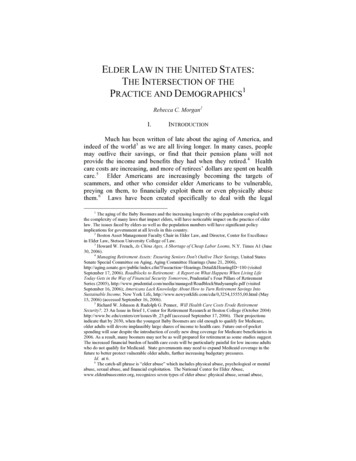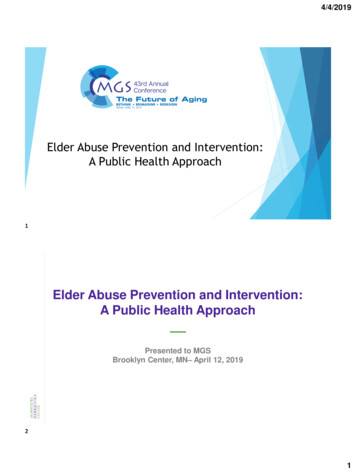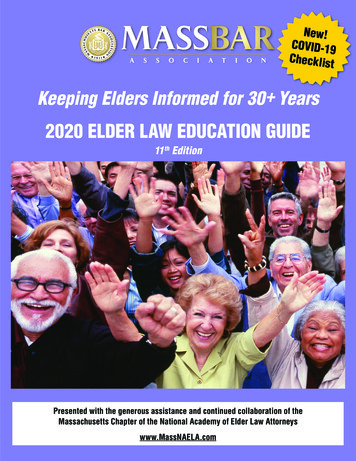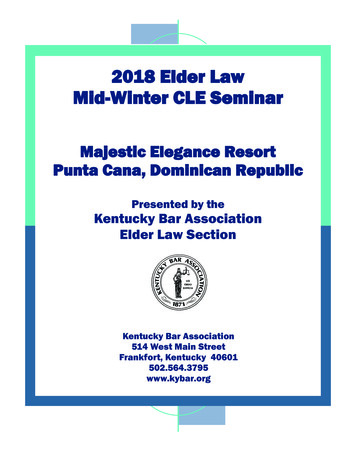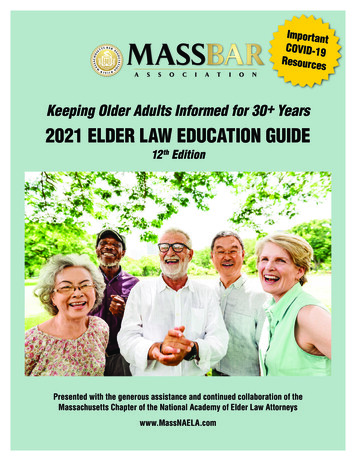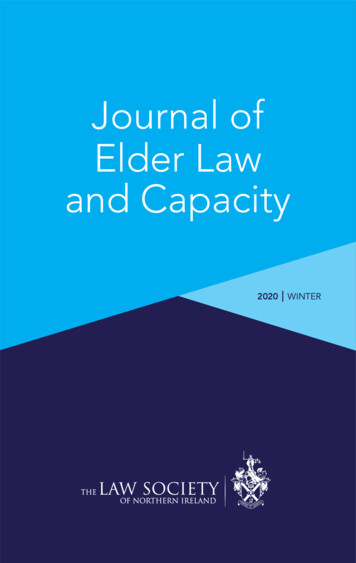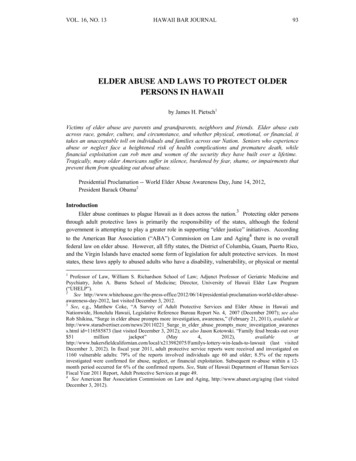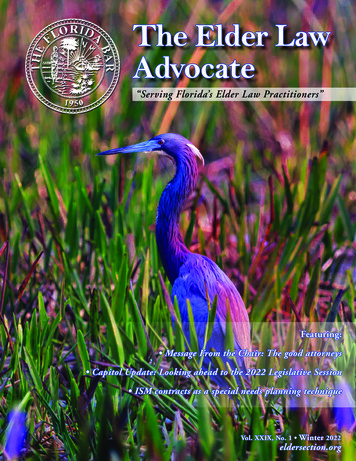
Transcription
The Elder LawAdvocate“Serving Florida’s Elder Law Practitioners”Featuring: Message From the Chair: The good attorneys Capitol Update: Looking ahead to the 2022 Legislative Session ISM contracts as a special needs planning techniqueVol. XXIX, No. 1 Winter 2022eldersection.org
The Elder Law AdvocateEstablished 1991A publication of the Elder Law Section of The Florida BarContentsOfficersCarolyn Landon, West Palm BeachChairHoward S. Krooks, Boca RatonChair-ElectVictoria E. Heuler, TallahasseeVice Chair, AdministrativeWilliam A. Johnson, MelbourneVice Chair, SubstantiveShannon M. Miller, GainesvilleTreasurerAmy J. Fanzlaw, Boca RatonSecretarySteven E. Hitchcock, ClearwaterImmediate Past ChairGenny Bernstein, West Palm BeachEditorEneami Bestman, West Palm BeachContributing MemberHeather B. Samuels, Boca RatonContributing Member,Publications CommitteeMatthew Thibaut, West Palm BeachContributing Member,Publications CommitteeSusan Trainor, TallahasseeCopy EditorEmily Young, TallahasseeProgram AdministratorMaliwan Theo, TallahasseeDesignStatements or expressions of opinion orcomments appearing herein are those of thecontri-butors and not of The Florida Bar or thesection.Message From the Chair: The good attorneys.3Capitol Update: Looking ahead to the 2022 Legislative Session. 4ISM contracts as a special needs planning technique.6Mark your calendar.8Committees keep you current.10Practice Management: Can law practice management softwarehelp you take your firm to the next level?.12Tips & Tales: Property in another state? No worries,there’s an ancillary for that. 14Tax Tips: The primary residence gain on sale exclusion:The basics and some loopholes.15Summary of selected case law.17The Elder Law Advocate will be glad to runcorrections the issue following the error.Submit ArticlesON THE COVERThe deadline for the SPRING 2022 EDITION: FEBRUARY 15, 2022. Articles on anytopic of interest to the practice of elder law should be submitted via email as anattachment in MS Word format to Genny Bernstein at gbernstein@jonesfoster.com,or call Emily Young at 850/561-5650 for additional information.Tricolored HeronRandy Traynor Photography12/2021Page 2 The Elder Law Advocate Vol. XXIX, No. 1 Winter 2022
Message From the Chairby Carolyn LandonThe good attorneysAs I sat down to write this message,I learned of the passing of my favoritejudge. It was unexpected. She was brilliant and hardworking. Her personalitycould be quite acerbic, and that likelycost her in a reelection bid. You did notwant to appear in her courtroom unprepared. But those who knew her only asa judge didn’t know the real Diana. Shewas a champion for the downtrodden,and not just by checkbook. She washands-on. Her grandfather, once homeless, became a successful businessmanand donated his vast earnings to charities.Her father, a former state senator, hada homeless shelter named in his honor.She and her eight siblings were raised tobe givers. She was a generous and givingperson. She was very much like the elderlaw attorneys I know.Why do I think she was like an elderlaw attorney? We are the champions ofthe downtrodden. We work hard and weoften become too emotionally involved.We spend many sleepless nights worriedabout clients. We do a lot of pro bonowork because we just can’t turn awaysomeone who is unable to pay. A goodfriend of mine, over 10 years ago, opinedthat we as elder law attorneys are thegood attorneys.Obviously we have to know the basicpractice areas, and if we choose to limitour practice to certain areas, we need toknow enough to refer a client. If we don’tdraft special needs trusts, we must knowwhen they are necessary so we can referour client to someone who does. Or ifwe don’t do guardianship, we need torecognize when one is necessary. We areall really good at referring to others andgood at asking for help and giving help.If you doubt that, read the listserv.So now that I’ve appealed to your sensitive side and told you how wonderful youare—because you are wonderful—what’smy pitch? Here it comes!WE NEED YOU!We need you to pitch in and join acommittee. Not just sign up, but becomeactively involved. We want your input.You are important. You are brilliant.Your opinions and your knowledge areimportant to us. You have so much tocontribute. You are elder law attorneys—the good attorneys.Call for papers – Florida Bar JournalCarolyn Landon is the contact person for publications for the Executive Council of the Elder Law Section.Please email carolyn@landonlaw.net for information on submitting elder law articles to The FloridaBar Journal for 2021-2022.A summary of the requirements follows: Articles submitted for possible publication should be MS Word documents formatted for8½ x 11 inch paper, double-spaced with one-inch margins. Only completedarticles will be considered (no outlines or abstracts). Citations should be consistent with the Uniform System of Citation. Endnotesmust be concise and placed at the end of the article. Excessive endnotesare discouraged. Lead articles may not be longer than 12 pages, including endnotes.Review is usually completed in six weeks.The Elder Law Advocate Vol. XXIX, No.1 Winter 2022 Page 3
Capitol Updateby Brian JogerstLooking ahead to the2022 Legislative SessionThe 2022 Legislative Session is an“early session,” meaning House and Senate committee meetings are being heldfrom September to December 2021, withthe Legislative Session beginning January11, 2022, with a scheduled ending onMarch 11, 2022.By way of background, prior to the2021 Legislative Session, legislators, staff,and advocacy groups were all concernedthat effects from COVID-19 wouldgreatly reduce state revenues and requiresignificant budget reductions. Instead,with the state’s economy quickly rebounding and the influx of federal relieffunds, no significant budget reductionswere required, and Florida placed additional revenues into its reserves. Goinginto the 2022 Session, state revenues continue to increase and are well above prepandemic levels, which should minimizebudget constraints or challenges duringthe upcoming session. These additionalrevenues come on top of remaining, andunexpended, federal relief funds that theLegislature held back during the 2021Legislative Session.Prior to the 2021 Legislative Session, both the House and the Senateimplemented COVID protocols, including weekly testing for legislatorsand staff prior to entering the Capitol.Public testimony was done via WebEx orlivestreamed from the Donald L. TuckerCivic Center. Groups and organizationsthat historically traveled to Tallahassee for“their day in the Capitol” canceled eventsand transitioned to “virtual days” ratherthan in-person meetings. Going into the2022 Legislative Session, legislators, staff,and constituents should have full accessto the Capitol Complex.One important issue to be consideredduring the 2022 Legislative Session willgarner a lot of attention from legislators and the media: redistricting. Every10 years, the House and the Senate arerequired to redraw all 160 House andSenate legislative seats and the U.S.congressional seats to reflect shifts inpopulation. Florida will receive one newU.S. congressional seat due to the increasein Florida’s population. Once the districtsare finalized, then the courts will reviewthe redistricting plan to ensure its compliance with the Florida Constitution FairDistricts Amendments, adopted by thevoters in 2010.Page 4 The Elder Law Advocate Vol. XXIX, No. 1 Winter 2022Legislative Session overviewCommittee meetings began in September, and legislators are filing bills.By the beginning of session, more than3,000 House and Senate bills will beintroduced, and the Elder Law SectionLegislative Committee will actively review many of the bills and provide inputon key issues. The following are issues ofinterest, and a more detailed update onlegislation will be provided in the nextupdate.Uniform Adult Guardianship andProtective Proceedings Jurisdiction Act(granny snatching)Florida is one of four states not toadopt the Uniform Act, and the ElderLaw Section is once again working closelywith RPPTL and the Uniform LawCommission to be included in the uniform protections while also safeguardingFlorida’s widely regarded guardianshipprotections.Guardianship rewritePart of a 10-plus-year initiative,RPPTL has been drafting a completerewrite of the Guardianship statute. TheElder Law Section continues to reviewthe draft proposal and provide feedback.
Clerk of the Courts GuardianshipImprovement Task ForceOver the summer, the Florida Clerksof the Court convened a work group tolook at revisions to Florida’s guardianshipstatutes. The Elder Law Section has beenan active participant on the task force,and clerks may also seek legislation during the upcoming session. No drafts orspecific proposals are currently available.Further details will be provided in thenext update.Supportive decision-makingLast session, Representative AllisonTant and Senator Joe Gruters filed legislation aimed to provide an alternativeto guardianship for individuals with disabilities. While the bills did not receivea committee hearing last year, Rep. Tantconvened a work group to meet over thesummer to resolve concerns raised withthe initial draft. The Elder Law Sectionhas been an active member of the workgroup and will continue to provide inputprior to session.Legislative CommitteeThe Legislative Committee is meeting every other Friday at 8:00 a.m. priorto session and then every Friday duringsession. As previously noted, more than3,000 bills are filed each session, andduring the 2021 Legislative Session, theLegislative Committee reviewed morethan 90 substantive bills and myriadamendments.If you want to participate on a substantive committee or review/comment onthe bills that are filed, please contact theELS Legislative Committee:Debra J. Slater, Chairdslater@slater-small.comTravis D. Finchum, Vice ChairTravis@specialneedslawyers.comGrady H. Williams, Jr., Vice Chairgrady@floridaelder.comWe have enjoyed success on legislativeissues by working with legislators andproviding feedback to them as well asby testifying at committee hearings. Weare grateful for the grass-roots supportwe have received and for the differenceit makes when working with legislators.You can also help by working with yourlocal legislators and being a local resourceto them. If you do not know your legislator, we remain willing to help facilitatean introduction with the legislator andhis or her staff. Continued relationshipbuilding with legislators, the state’spolicy makers, is a critical componentof our advocacy efforts because the localrelationships and outreach to legislatorsfrom trusted sources helps the Elder LawSection continue to be a trusted voiceand improves our advocacy efforts.Brian Jogerst and Greg Black are cofounders of Waypoint Strategies LLC, aTallahassee-based governmental consultingfirm. Waypoint Strategies, with more than40 years’ experience lobbying on health careand legal issues, is under contract with theAcademy of Florida Elder Law Attorneysand the Elder Law Section of The FloridaBar for lobbying and governmental relations services in the State Capitol.Visit the Elder Law Section onFacebookWe are happy to announce that the Elder Law Section has created a Facebookpage. The page will help promote upcoming section events as well as providevaluable information related to the field of elder law.Part of the section’s mission is to “cultivate and promote professionalism,expertise, and knowledge in the practice of law regarding issues affecting theelderly and persons with special needs ” We see this Facebook page as a way ofhelping to promote information needed by our members.We need your help. Please take a few moments and “Like” the section’s page. You cansearch on Facebook for “Elder Law Section of The Florida Bar” or visit facebook.com/FloridaBarElderLawSection/.If you have any suggestions or would like to help with this social mediacampaign, please contact:Alison Hickman904/264-8800alison@ floridaelder.comThe Elder Law Advocate Vol. XXIX, No.1 Winter 2022 Page 5
ISM contracts as a special needsplanning techniqueby David J. Lillesandon behalf of the Special Needs Trust CommitteeWhen a person with disabilities whois on SSI disability or SSI elder benefitsreceives an unexpected inheritance orlawsuit proceeds, the event calls for somespecial needs planning to continue theSSI monthly checks and Florida Medicaid without going over the 2,000resource limit. Many think the best oronly answer is an individual or pooledspecial needs trust (SNT). That is not thecase. This article discusses the advantagesof a room and board contract for a termof months or lifetime, which can in somecircumstances have significant cash andother benefits over a personal servicescontract or a SNT.In 1999 the Social Security Act waschanged1 to impose a Supplemental Security Income (SSI) transfer of resourcespenalty for transferring assets for less thanfair market value (FMV) for a period ofmonths capped at 36 months. Before thischange, persons with disabilities couldsimply give away excess resources andcontinue to receive SSI, which wouldtrigger continuation of Medicaid.2In response to the new law, the SocialSecurity Administration (SSA) immediately added SI 01150.005 to the ProgramOperations Manual System (POMS) toexplain how the agency is to assess FMVand to delineate the exceptions to thetransfer penalty, giving the special needsattorney some additional and often bettertools to maintain public benefits.SSA defines fair market value as “thecurrent market value (CMV) at the timethe resource transfers,” noting that CMVis the going price at which the resourcecould reasonably be expected to sell onthe open market in the local area.3 SSAdefines compensation as the cash orother valuable consideration provided inexchange for the resource, paid by cashor real or personal property received inexchange.4The value of the compensation received by the SSI claimant is determined by looking at the legally bindingagreement between the SSI claimanttransferor and the person or entityreceiving the resource. Particularlyimportant is the POMS statement that“The transferor may actually receive thecompensation before, at, or after theactual time of transfer.”5 In-kind supportand maintenance (ISM) may provide thecompensation for the transfer valued atits full CMV multiplied by the length oftime for which the ISM is to be providedunder the agreement. SSA provides ahelpful example of a contract for a periodof years:Example: Determining whether ISMappliesBill Thomas transfers 30,000 in cashto his sister based on a written contractthat she will provide him with food andshelter for five years. The sister values thefood and shelter at 500 per month. Theclaims representative (CR) develops Bill’sliving arrangements and determines hehas a flat fee arrangement with his sisterand is required to pay 500 per month.The food and shelter for five years isworth 30,000 (5 years x 6,000 peryear). Therefore, Bill received FMV forthe 30,000 he transferred. ISM is notcounted because Bill has prepaid for hisfood and shelter with the 30,000 hetransferred.SSA staff are instructed to use theactual value of the ISM as defined in thestandard food and shelter instructions6Page 6 The Elder Law Advocate Vol. XXIX, No. 1 Winter 2022and not a one-third reduction or presumed maximum value (PMV) to setthe value of the compensation in theagreement.7 Staff are further instructedto obtain a statement from the ISMprovider to confirm the ISM is beingprovided using SSA’s form 8011-F3(Statement of Household Expenses andContributions).What about a legally binding agreement that in exchange for some real property, personal property, or cash, the SSIclaimant will receive ISM for his or herlife? Staff are instructed to multiply theyearly CMV of the ISM provided by the“years of life remaining” corresponding tothe SSI claimant’s age (or next lower age)found in POMS SI 01150.005F. Notethat this chart may be different fromthe life expectancy charts in the FloridaMedicaid Manual.SSA provides two useful examplesshowing the effect of an agreement toprovide ISM for life:Example 1: Total value of ISM resultsin FMV compensationValerie Payne transfers non-home realproperty valued at 185,000 to her sister.As compensation, her sister agrees toprovide Valerie with room and board inthe sister’s home for the rest of Valerie’slife. ISM development shows that the sister’s total household expenses are 1,500per month. The household consists ofthree persons, including Valerie whowas age 53 at the time of the transfer.The CMV of the ISM is 6,000 peryear ( 1,500/3 500 per month x 12months 6,000). Then, 6,000 x 31.61(average years of life remaining at age 50) 189,660 compensation. In this case,Valerie received FMV for the transferred
resource. We do not count ISM becausethe individual prepaid for her own foodand shelter with the value of the homeshe transferred. For the procedure ondetermining an individual’s contributiontoward household operating expenses, seeSI 00835.480D.Example 2: Total value of ISM resultsin uncompensated valueAssume the same case facts as in Example 1 except that Valerie is 80 years oldat the time of the transfer. As in Example1, the ISM is worth 6,000 per year.At 80 years of age, the life expectancytable indicates 7.16 years. Multiplying7.16 years times 6,000 results in compensation of 42,960. In this case thereis uncompensated value of 142,040( 185,000 minus 42,960). Therefore,Valerie is subject to a period of ineligibility for SSI because she transferred thehouse for less than FMV.The agreement between Valerie Payne,the SSI claimant, and her sister couldarise in a couple of ways. Perhaps Valerieand her sister have been living togetherfor years when Valerie inherits a home(described in the example as “non-homereal property”) from another person. Orperhaps Valerie has been living in herown home, and now that she is becomingmore physically frail, she wants to movein with her sister who can help care forher. Valerie’s former home becomes acountable resource since it is no longerher primary residence.In all likelihood, before the ISMagreement and property transfer, eitherscenario would see Valerie’s SSI check godown due to her inability to pay her fairshare of her sister’s household expenses.SSI is subject to a one-third deductionfor the ISM Valerie is receiving from hersister who is shouldering disproportionately more of the household expenses.This one-third deduction from Valerie’sSSI check amounts to approximately 3,000 per year.At this point Valerie decides to sell forcash or transfer the real property andmove in with her sister. What are theoptions?Option 1: Give the money to her sister.If Valerie sells the house, receives the 185,000 sales proceeds, and gives themoney to her sister with no agreement foranything in return, the transfer penaltyapplies in full. The amount transferred( 185k) divided by the federal benefitrate (currently 794 per month) resultsin a penalty calculation of 232 months,but is capped at 36 months from the dateof transfer. While that choice results ina loss of approximately 10,000 tax freeper year for three years, or 30,000 total,the more significant potential loss is theSSI-related Medicaid health insurancecoverage. There are no income tax consequences to the sister since it is a gift.Option 2: Use a special needs trust. IfValerie sells the home, receives 185,000,and puts the funds in a SNT with thetrust paying Valerie’s share of the household expenses, the trust’s contributiontriggers the ISM reduction for paymentsfor food and shelter. She still loses over 3,000 per year in tax-free SSI benefitsby having a trust because her SSI check isreduced from 794 to 530 per month.And she incurs attorney fees, trustee fees,and CPA fees, and if she uses a pooledor individual SNT, a potential startupfee as well. The result is that Valerie hasmore expenses and less tax-free income.At 31 years of life expectancy, the onethird loss of tax-free SSI income amountsto 93,000, and the trustee fee couldamount to 172,000 (at 3% over 31years).Option 3: Use a personal services contract. Instead, Valerie decides to engagein some other special needs planning andtransfers the sales proceeds to her sisterin an agreement for personal services tobe received in the future. Such personalservice contracts (PSC) are specificallyallowed under the same POMS.8 Howto draft a proper PSC is laid out in anSSA Atlanta Regional Chief CounselPrecedent (opinion letter).9 The amountthe sister receives is IRS-taxable incomeof 185,000, which results in a potentialsubstantial loss of 36,011 if using thestandard deduction.Option 4: Use the ISM contract forroom and board detailed in the POMSabove. The benefit to Valerie of using theSSA-suggested option of transferring thesales proceeds or transferring title to thenon-home property to the sister includeavoiding: the ISM deduction from her SSIchecks; attorney fees for trust preparation; and lifetime trustee fees and expenses.Once the sister receives the paymentunder the terms of the contract, shedoes not have to account further for thefunds. She is required under the contractto provide food and shelter for Valerie,but she does not need to maintain anaccount to do so. Ongoing accountingfees are also eliminated.In addition, three separate tax expertshave advised our office in three separatecases that the room and board contractto share food and shelter expenses resultsin no federal income tax consequencesfor the person who receives the fundsand agrees to provide the food and shelter. Thus, the 36,011 income tax lossincurred by using the PSC is eliminatedby the ISM agreement.Special needs planning should not beone shoe fits all, nor should special needsplanners apply only a single techniqueto a particular SSI claimant’s situation.Combinations of appropriate spenddown (paying off credit card bills; paying down mortgages; purchasing newappliances, vehicles, clothes, computers,dental care, and infinitely more), ABLEaccounts for those eligible, some fundsin ISM contracts, etc., can make clientsextremely happy to have a special needsplan tailored to meet their individualneeds.continued, next pageThe Elder Law Advocate Vol. XXIX, No.1 Winter 2022 Page 7
ISM contracts. . .from previous pageRoom and board or ISM contracts caneffectively handle small or larger amountsof funds since such contracts can be fora term of several months, several years,or as described by SSA in the POMSexample, for a lifetime. Additionally,room and board contracts increase theSSI check over the use of SNTs by legallyavoiding the monthly loss of full SSIbenefits due to ISM deductions.Such contracts are not appropriate inevery case, but where they are, the advantages over SNTs and PSCs are substantial.David J. Lillesand,Esq., is a partner ofLillesand, Wolasky& Hitchcock PLwith offices inMiami and TampaBay, Florida. Heis past chair of theELS Special NeedsTrust Committee and a frequent lecturerfor NOSSCR, NAELA, ASNP, and otherstate and national organizations on thetopic of Social Security, SSI, Medicareand Medicaid, and the application of thePatient Protection and Affordable CareAct to the practice of social security andelder law. David is one of the authors ofChapter 17, “Special Needs Trusts” in theFlorida Bar Lexis/Nexus publication, TrustAdministration in Florida, 10th edition.Endnotes1Foster Care Independence Act of 1999 (P.L.106-169).2Florida Statutes § 409.903(2) enacted pursuantto the Social Security Act, Section 1634.3SI 01150.005.B.1.4SI 01150.005.B.2.5SI 01150.005.C.2.6POMS SI 00835.001.7POMS SI 01150.005.D.3.8POMS SI 01150.005.D.49PS 01820.011 Florida, A. PS 14-102 Supplemental Security Income Resource Determination—Validityof Personal Services Contract.Mark your calendar!ELS EXECUTIVE COUNCIL MEETINGJanuary 13, 2022JW Marriott Orlando Bonnet Creek Resort & SpaOrlando, Florida2022 ELDER LAW ESSENTIALSJanuary 13, 2022 In-Person and Live WebcastJW Marriott Orlando Bonnet Creek Resort & SpaOrlando, Florida2022 ELDER LAW ANNUAL UPDATEJanuary 14-15, 2022 In-Person and Live WebcastJW Marriott Orlando Bonnet Creek Resort & SpaOrlando, FloridaFLORIDA BAR ANNUAL CONVENTIONJune 22-25, 2022Signia by Hilton Orlando Bonnet CreekOrlando, FloridaPage 8 The Elder Law Advocate Vol. XXIX, No. 1 Winter 2022
YOUR SNTTRUSTEETRUST US TO PROTECT THEFUTURE FOR YOUR CLIENTSEACH AND EVERY DAY.Affordable FeesProtect Public Benefits EligibilityNo Minimum Trust Deposits or BalancesProfessional and Compassionate ServiceExperienced and Knowledgeable Trustee“You have been wonderful to my sister and family. I appreciate your prompt response toour questions, as well taking care of all the details involved in transferring her trustaccount from another trust company. This Thanksgiving I will be thinking of both of youwhen remembering all the people for whom I am thankful.”- Anne K., Beneficiary’s FamilyThe ElderLaw Advocate Vol. XXIX, No.1 Winter FL2022 33756 Page 9727 - 210 - 1185 901 CHESTNUTSTREET,CLEARWATER,www.GuardianTrusts.org
S ECTI ON N EW SCommittees keep youcurrent on practice issuesContact the committee chairs to join one (or more) today!ADMINISTRATIVE DIVISIONBUDGETChairShannon MillerThe Miller Elder Law firm.comCONTINUING LEGAL EDUCATIONChairDanielle R. FallerHemness Faller Elder Law,Brandon813/661-5297 a R. McMillanMcCarthy Summers et. al., ONSChairGenny BernsteinJones Foster, PA,West Palm TIVE DIVISIONABUSE, NEGLECT, & EXPLOITATIONChairEllen L. CheekBay Area Legal Services Inc.,Tampa813/232-1343, ext. 121echeek@bals.orgESTATE PLANNING & ADVANCEDIRECTIVES, PROBATEChairAmy M. CollinsWaldoch & McConnaughhay ChairHeather Boyer SamuelsSolkoff Legal PA, Delray hairTwyla L. SketchleyThe Sketchley Law Firm LEGISLATIVEChairDebra J. SlaterSlater & Small PLLC,Coral Springs954/753-4388dslater@slater-small.comPage 10 The Elder Law Advocate Vol. XXIX, No. 1 Winter 2022MEDICAID/GOVERNMENT BENEFITSChairHeidi M. BrownOsterhout & McKinney PA,Fort Myers239/939-4888heidib@omplaw.comSPECIAL NEEDS TRUSTChairKole J. LongSpecial Needs Lawyer omVETERANS BENEFITSChairTeresa K. BowmanTeresa K. Bowman PA, Sarasota941/735-5200tkbowman@tkbowmanpa.comSPECIAL COMMITTEESBYLAWS REVISIONChairJason A. WaddellWaddell & Waddell PA, RTIFICATION(Appointed through The Florida Bar)ChairJana McConnaughhayWaldoch and McConnaughhay PA,Tallahassee850/385-1246jana@mclawgroup.com
LITIGATIONDISABILITY LAWChairJack M. RosenkranzRosenkranz Law Firm, Tampa813/223-4195jackrosenkranz@gmail.comSTRATEGIC PLANNINGChairCara C. SingeltaryHunt Law Firm PA, Leesburg352/365-2262cara@huntlawpa.comNEW PRACTITIONERSINCLUSIVITY & DIVERSITYChairCollett P. SmallSlater & Small PLLC,Pembroke Pines954/437-4603csmall@slater-small.comLAW SCHOOL LIAISONChairEnrique D. ZamoraZamora, Hillman & Villavicencio,Coconut Grove305/285-0285ezamora@zhlaw.netChairMax J. SolomonHeuler-Wakeman Law Group RSHIPChairJill R. GinsburgGinsburg Shulman PLFort rCollett P. SmallSlater & Small PLLC,Pembroke ChairAlison E. HickmanGrady H. Williams, Jr., LLM Attys.PA, Orange Park904/264-8800alison@floridaelder.comUNLICENSED PRACTICE OF LAWChairJohn R. FrazierJohn R. Frazier JD, LLM, PLC/Jos. Pippen PL, Largo727/586-3306, ext. 104john@attypip.comWrap up some savingsfor yourself.Enroll in the FedEx Advantage discounts programthis season and save on domestic and internationalshipments all year long.As a member of the Florida Bar, you can join for free and save:150% off FedEx Express domestic shipping50% off FedEx Express international shipping20% off FedEx Ground shippingUp to 20% off FedEx Office services2To enroll, go to fedex.com/floridabarsavings or call 1.800.475.6708.F edEx shipping discounts are off standard list rates and cannot be combined with other offers or discounts. Discounts are exclusive of any FedEx surcharges, premiums, minimums, accessorial charges, or special handling fees. Eligible services and discounts subject to change. For eligible FedEx services and rates, please call 1.800.GoFedEx 1.800.463.3339. See the applicable FedEx Service Guide for terms and conditions of service offerings and money-back guarantee programs.1 FedEx Office black & white copy discounts are applied to 8-1/2" x 11", 8-1/2" x 14", and 11" x 17" prints and copies on 20-lb. white bond paper. Color copy discounts are applied to 8-1/2" x 11", 8-1/2" x 14", and 11" x 17" prints and copies on 24-lb. laser paper. Discount does not apply to outsourced products or services, office supplies, shipping services, inkjet cartridges, videoconferencing services, equipment rental, conference-room rental, high-speed wireless access, Sony PictureStationTM purchases, gift certificates, custom calendars, holiday promotion greeting cards, postage, and custom branded boxes. This discount cannot be used in combination with volume pricing, custom-bid orders, sale it
Page 2 The Elder Law Advocate Vol. XXIX, No. 1 Winter 2022 The Elder Law Advocate Established 1991 A publication of the Elder Law Section of The Florida Bar 12/2021 The deadline for the SPRING 2022 EDITION: FEBRUARY 15, 2022. Articles on any topic of interest to the practice of elder law should be submitted via email as an


